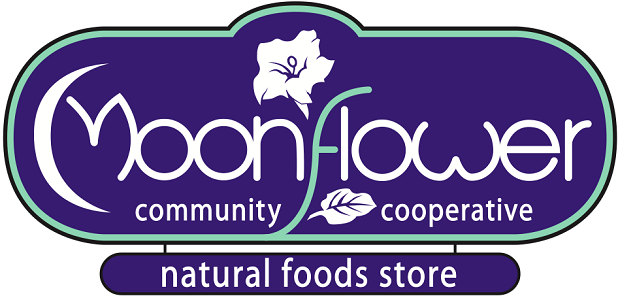Adapted from a farm visit and interview in June 2018 with Raymond Betz and Javier Gonzalez, who will succeed Raymond as Castle Valley Farm’s Farm Manager
Situated in a stunning desert valley surrounded by sandstone spires and the majestic La Sal Mountains, Castle Valley Farms focuses on “cultivating soil and soul” by both developing young people and producing nutrient-rich foods for the community. Castle Valley Farms is a subsidiary of Castle Valley Incorporated, a non-profit umbrella organization which also includes The Little Suitcase thrift store in Moab and the DayStar Adventist Academy adjacent to the farm. The employees and students engage in all aspects of the farming operation while adhering to a plant-based diet and developing new, exciting ways to prepare and preserve the foods they produce.
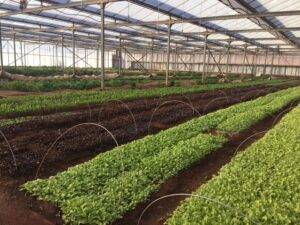
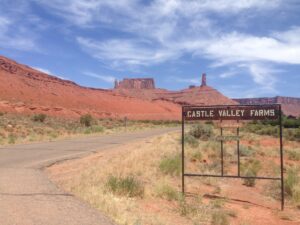
The tour of Castle Valley Farms began with a glimpse into their greenhouse containing rows of heavily pruned cherry and beefsteak tomatoes. Hard pruning, which entails removing the “suckers” at the junction of the leaf and stem and sometimes removing the bottom leaves altogether, eases the trellising process and encourages the vertical, dense growth of these fruiting plants. In addition to the greenhouse, they manage a few other sprawling fields and a diverse orchard.
They focus on growing crops with a substantial return, such as asparagus, and some of the food feeds the staff and students at the school. They have an orchard featuring apples, apricots, plums, peaches, cherries, nectarines, and pears alongside ample land for hay crops. Much of the fruit is used by the campus. They don’t see much demand for orchard fruits from retail establishments or restaurants. Raymond has maintained the orchard over the past several months, but the new Farm Manager-in-training, Javier Gonzales, may explore orchard expansion in the future. They also grow and distill their own lavender to produce essential oils. They sell the oil when they set up booths at various events or at their on-site farm store. Farm customers and shoppers of Moonflower Co-op and Village Market can expect eggplants, tomatoes, peppers, cantaloupes, melons, carrots, beets, and watermelons in the upcoming summer months.
Farming on their scale requires attention to detail, long-term planning, and the ability to address unexpected challenges on a regular basis. Throughout the tour, Raymond Betz (pictured, right), who has managed the farm since August 2017, emphasized the challenges of pest management, seasonal weather changes, and their adherence to plant-based living. Unexpected hard frosts can heavily impact the orchard and other aspects of the farm. Fortunately, the greenhouse allows them to offer a consistent supply of greens despite seasonal conditions. They avoid many of the animal product-based fertilizers and soil amendments, such as blood meal, feather meal, and chicken manure, due to the widespread contamination with byproducts of industrial animal agriculture. They firmly believe that boosting the nutrition and health of the plants will deter the damaging pest issues they have struggled with in the past, such as aphid infestations on their tomatoes. This principle, Raymond believes, applies to human health as well.
The DayStar Academy students are heavily involved in the Farm. The students study agriculture as a class, so they regularly come out to the fields and learn through hands-on experience. They experience all levels of the farm, including staffing the Farmers’ Market and preparing and selling their popular carrot hot dogs. Character development is a huge element of their curriculum, so teachers emphasizes the importance of work ethic and an understanding of efficient work techniques. The Academy’s curriculum incorporates more vocational training than traditional schools. Raymond noted their focus on a “balance between spiritual, mental, and physical development” at the Academy, which is why they prioritize the students’ interactions with nature. According to Raymond, this element is “largely missing from the traditional school setting.” They incorporate both physical and mental challenges throughout the day, and they believe this diversity fosters greater retention and overall wellness.
The staff aligns closely with the spiritual philosophy and values of the farm. Raymond left Castle Valley on June 22nd for Alabama to focus on working with people experiencing lifestyle-related diseases, such as diabetes and heart disease. He wants to teach them how to utilize natural methods to achieve health and wellness while also incorporating spiritual forms of healing. Their new Farm Manager, Javier Gonzalez (pictured, left), will succeed Raymond and is originally from Oregon. He recently met the Castle Valley Farms crew at a Generation of Youth for Christ (GYC) conference in Phoenix, AZ. In Oregon, he gained experience with vast monocultures, such as seed potatoes, and heavy machinery, so his new position with Castle Valley Farms will depart quite significantly from his previous work environment. Another key player at the farm, Tommy Mayer, works part-time on the farm as their Farm Assistant and part-time as a science teacher at the school. He spearheads the development of many of the farm’s value added items as well as their robust sprouts and microgreens. Tommy typically works at their stand at the Moab Farmers’ Market, doling out seasonal produce, carrot hot dogs, and occasional baked goods.
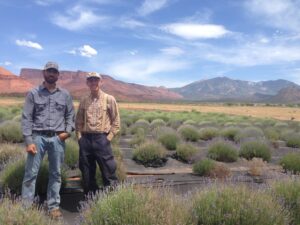
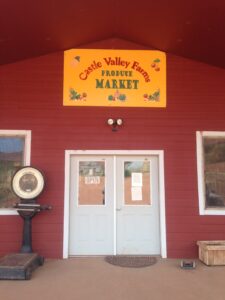 They sell their produce at Moonflower Co-op and Village Market and partner with various local food establishments, including 98 Center, YummyTown Mobile Mediterranean Food Truck, and All Good Super Fresh, Moab’s only juice and smoothie food truck. Last season, they also sold to Eklecticafe. Their on-site farm store caters to community members who wish to buy directly from the farmers. Castle Valley residents typically trickle into the store, and they rely on an honor system if staff members aren’t available to process their requests directly.
They sell their produce at Moonflower Co-op and Village Market and partner with various local food establishments, including 98 Center, YummyTown Mobile Mediterranean Food Truck, and All Good Super Fresh, Moab’s only juice and smoothie food truck. Last season, they also sold to Eklecticafe. Their on-site farm store caters to community members who wish to buy directly from the farmers. Castle Valley residents typically trickle into the store, and they rely on an honor system if staff members aren’t available to process their requests directly.
We concluded our farm tour and interview with a discussion about the future of Castle Valley Farms. Raymond would love to see an expansion of berry production and an exploration of unique orchard fruits. A long-term possibility, depending on funding, would include the development of a geothermal-powered greenhouse to grow citrus and other products requiring greater temperature controls. Two exciting future projects include experimenting with mushroom cultivation and growing ancient wheat varieties to cater to folks with gluten issues stemming from the prevalence of hybridized wheat varieties.
We value Castle Valley Farms which continues to produce nutritious, chemical-free, bountiful produce for our community, despite facing the extreme hot and dry conditions of our high desert community. At Moonflower Co-op, we strive to support local and regional growers, artisans, and producers and foster a strong local economy. Consider visiting Castle Valley Farms, stopping by their lovely farm store, and picking up some of their fresh lavender, orchard fruits, seasonal greens, and more!
